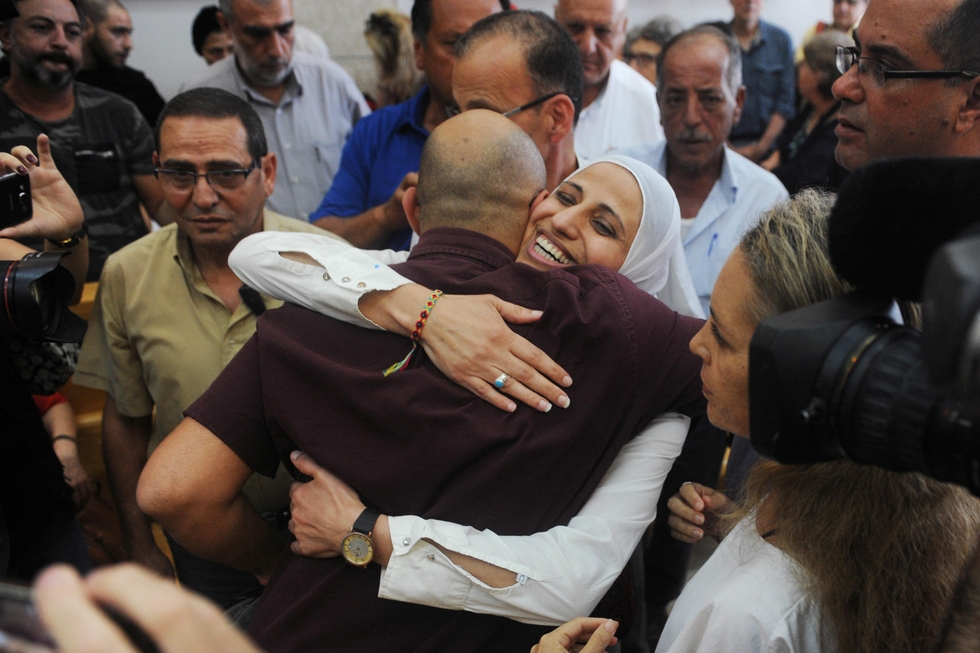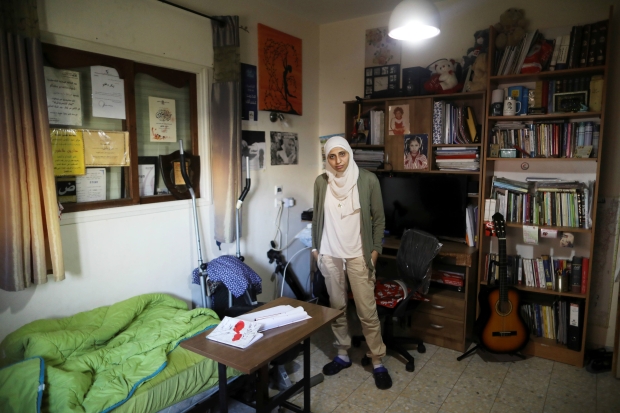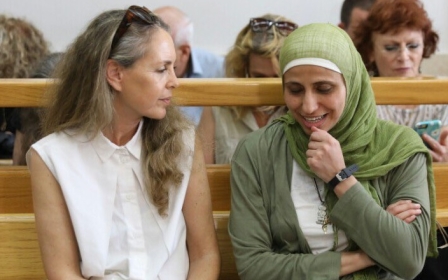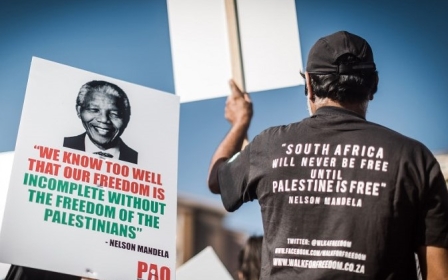Israel sentences Palestinian writer Dareen Tatour to jail for 'inciteful' poem

Israel sentenced Palestinian writer and poet Dareen Tatour to five months in prison on Tuesday after convicting her of "inciting violence" over a poem she posted on social media that prosecutors claimed urged violence against the occupation.
Nazareth magistrates' court in May found Tatour, a Palestinian citizen of Israel, guilty over the poem "Resist, My People, Resist Them", posted on Facebook in 2015, as well as separate posts dealing with Palestinian resistance.
Prosecutors argued that the poem incited violence, and that Tatour had also shared and commented on a post by Islamic Jihad declaring its commitment to a new intifada, or "uprising" - meaning, according to the charges, that she supported "terrorism".
"Resist, my people, resist them.
In Jerusalem, I dressed my wounds and breathed my sorrows
And carried the soul in my palm
For an Arab Palestine.
I will not succumb to the peaceful solution,
Never lower my flags
Until I evict them from my land."
- Excerpts from Resist, My People, Resist Them by Dareen Tatour
The 36-year-old poet's lawyer, Gaby Lasky, told the Middle East Eye in May that the poem had been misinterpreted by Israeli translators, that the content was "artistic expression" rather than a call to violence, and that the Israeli charges ran counter to the freedom of expression of her client.
"The verdict violates the right of speech and freedom of expression. It is an infringement on cultural rights of the Palestinian minority inside Israel. It would lead to self-censorship and self-criminalisation of poetry," Lasky said.
'I will keep writing poetry'
In a video message published on social media before her sentence, Tatour said that she had suffered for the last three years because of "the unjust trial" before the Israeli court.
"I expect imprisonment. After the Jewish nation-state law was passed, everything is expected. I don't believe there is justice in Israel and I will keep writing poetry with the language I want and with the words I choose to write. I will not accept any law to tell me what to write and which words to pick up," Tatour said.
After her verdict in May, she told media that her trial "ripped off the mask" off Israeli democracy and justice.
More than 150 American literary figures have called for Israel to free Tatour, including Pulitzer Prize winners Alice Walker, Claudia Rankine, Naomi Klein and Jacqueline Woodson.
Tatour was arrested on 11 October 2015, about a week after she published her poem on Facebook.
She said Israeli interrogators initially had little to question her about.
"First, they accused me of incitement based on a poster I posted in 2014, which contained the words 'I'm the next martyr'. The martyrs are the victims of the Israeli occupation, who are being shot by soldiers," Tatour said.
"The accusation was weak, so they dug into my Facebook and found the poem."
She said the second verse was misinterpreted.
"Here, they interpreted a line in the poem that says 'Resist, my people, resist them, Resist the settler’s robbery, And follow the caravan of martyrs' - as inciting people to be killed and be martyrs."
The poem tells a story of three Palestinians, "victims of the Israeli occupation", according to Tatour: Mohammed Abu Khdeir, a teen who was kidnapped and burned to death by three Israeli settlers in Jerusalem in 2014; Hadeel al-Hashlamoun, 18, who was shot by Israeli troops in Hebron city; and 18-month-old Ali Dawabsheh, who was burned alive in the fire with his parents in an arson attack by Israeli settlers in July 2015, in Duma, in the West Bank.
"Those are all martyrs. Although, it feels odd to call them like that in English or Hebrew because they are victims. But in Arabic, there is no separation between the meaning of martyr and victim when he or she is shot by Israeli soldiers," she said.
"Palestinians who were killed in the Israeli war over Gaza are called martyrs."
Tatour's case has been compared to the case of Israeli soldier Elor Azaria, who was released in May after spending nine months in prison for killing 20-year-old Palestinian Abdel Fattah al-Sharif in the city of Hebron in April 2016 - highlighting the disproportionate price Tatour has been made to pay compared to Israelis found guilty of far more severe charges.
House arrest
Tatour was detained for three months and was interrogated five times by Israeli officers. Each interrogation lasted five to six hours, she told the MEE.
In January 2016, Tatour was released to house arrest for six months after being fitted with an ankle monitor, at the home of her brother in the Kiryat Ono neighbourhood of Tel Aviv.
"They considered me a danger for Israelis, but when they dictated the location of my house arrest, they could not find a place more Israeli than Tel Aviv to do that. I find this ironic," she said.
She added that house arrest was a harsh experience.
Far from her family in the village of Reineh, she was not allowed to use a mobile phone or the internet or even to publish texts in the media. After four months of house arrest, she was allowed to leave the house for two hours on weekends, if accompanied by a relative.
"I had two choices, detention or house arrest. I was not allowed to publish any poetry or texts in the media according to the Israeli court," she said.
Tatour considers Fadwa Tuqan, a Palestinian poet, and Nazik al-Malaika, an Iraqi poet, as her role models and intellectual inspiration.
I was not allowed to publish any poetry or texts in the media according to the Israeli court
- Dareen Tatour
She has published one poetry collection in 2010 titled The Final Invasion. Her second collection, The Atlantic Canary Tales, was due to be published in December 2015, but her arrest prevented that.
In addition, Tatour has written another book about her detention waiting for publication.
"I wrote a lot while in prison. The Israeli prosecution tried to insist that I provoked the publishing ban when my poem A Poet Behind Bars appeared in the International Translation Day in English on Pen International website.
"I wrote this poem before the ban, on 2 November, the day I was indicted, in Jalameh prison," she said.
Her translated poems appeared recently in A Blade of Grass: New Palestinian Poetry, a UK bilingual Arabic and English anthology published in 2017, that presents Palestinian poets.
Its editor, sci-fi novelist and poet Naomi Foyle told MEE that "tens of thousands of recorded instances of Zionist hate speech go unnoticed by Israeli courts. In convicting Dareen Tatour of incitement, Israel confirms again its true nature: an apartheid prison state."
The last text Tatour wrote was titled "The Final Chapter", Tatour told MEE.
"It is a poem. I am asking whether I would face freedom or prison after the verdict. In the end, I conclude that whatever the decision will be, I will end up free."
Palestinian community inside Israel
Tatour belongs to the Palestinian community that remained within the new state of Israel following the 1948 Arab-Israeli war. Palestinian citizens of Israel now number some 1.6 million, making up some 20 percent of Israel's population.
In 1948, almost 700,000 Palestinians were forcibly expelled by Zionist militias. An estimated five million Palestinians are refugees today, prevented from returning to their homes in present-day Israel.
Despite holding Israeli citizenship, Palestinians in Israel lived under a military administration between 1948 and 1967 and faced curfews, severe restrictions on free speech and political rights, and persecution in front of military courts.
The recent passage of the "nation state" law earlier this month has garnered outrage for enshrining Israel's Jewish identity in the Basic Law - Israel's equivalent of a constitution - a move critics have slammed as further cementing a two-tier ethnic system in Israeli law.
But many Palestinian citizens of Israel have been unsurprised by the new law, pointing to pre-existing discrimination both on the ground and in law, effectively making them second-class citizens when compared to their Jewish peers.
New MEE newsletter: Jerusalem Dispatch
Sign up to get the latest insights and analysis on Israel-Palestine, alongside Turkey Unpacked and other MEE newsletters
Middle East Eye delivers independent and unrivalled coverage and analysis of the Middle East, North Africa and beyond. To learn more about republishing this content and the associated fees, please fill out this form. More about MEE can be found here.





